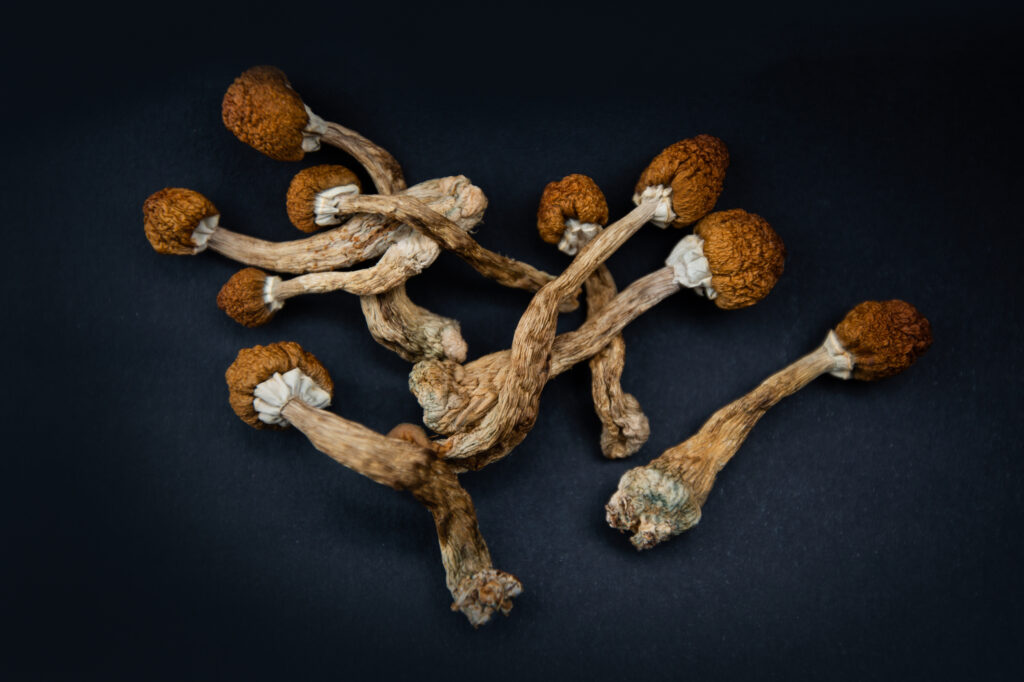Psilocybin research has continued to accelerate in 2025, with studies exploring its effects on everything from depression and anxiety, to addiction and neurological health.

Dried psilocybin mushrooms.
Despite it only being May, there have been numerous psilocybin-related studies published so far in 2025, highlighting the growing therapeutic promise of psilocybin. In the list below, we breakdown the 15 most important of these studies.
Study: Microdosing Psilocybin May Reduce Neuroinflammation and Support Mental Health
A study published in Experimental Neurology found that microdoses of psilocybin may help reduce neuroinflammation and support mental health. Conducted on mice, the research showed reduced inflammatory markers and behavioral improvements, suggesting microdosing could be a low-risk strategy for treating anxiety and mood disorders.
Psilocybin Shows Strongest Evidence for Treating Alcohol Use Disorder in Psychedelic Therapy Review
A comprehensive review published in Nature Medicine found that psilocybin has the strongest evidence among psychedelics for treating alcohol use disorder. The analysis covered multiple clinical trials and showed consistent reductions in alcohol consumption, craving, and relapse rates following psilocybin-assisted therapy.
Study: Psilocybin and MDMA Show Potential for Treating Prolonged Grief Disorder
A new study published in Frontiers in Psychiatry suggests that both psilocybin and MDMA may be effective in helping patients suffering from prolonged grief disorder. Researchers found that these substances may improve emotional processing and reduce grief-related symptoms, providing a foundation for future clinical trials.
Psilocybin Shows Potential in Treating Repetitive Mild Head Injuries, Finds Study
A study published in Brain Research Bulletin found that psilocybin improved cognitive function and reduced inflammation in a rodent model of repetitive mild traumatic brain injury. The findings suggest psilocybin may help mitigate long-term neurological damage from repeated head trauma.
Study: Psilocybin Therapy May Help Those With Parkinson’s Disease Overcome Anxiety and Pessimism
A study published in Journal of Neuropsychiatry and Clinical Neurosciences found that psilocybin-assisted therapy may reduce anxiety and negative thought patterns in patients with Parkinson’s disease. Participants reported improved mood and increased optimism, pointing to psilocybin’s potential as a supportive mental health intervention in neurodegenerative conditions.
Study Finds Psilocybin May Offer Breakthrough Relief for Phantom Limb Pain
A study published in PAIN Reports found that psilocybin significantly reduced phantom limb pain in amputee patients. The research suggests that psilocybin’s impact on brain plasticity and pain perception may offer long-term relief for individuals suffering from this challenging condition.
Study Finds Psilocybin Linked to Significant Reduction in Suicidal Ideation
A study published in Psychological Medicine found that psilocybin use was associated with a sharp decrease in suicidal thoughts among participants with treatment-resistant depression. The researchers reported sustained improvements in mood and mental outlook weeks after treatment.
Study: Psilocybin-Assisted Therapy Shows Promise for Treating Alcohol and Tobacco Addiction
A study published in Addiction Biology found that psilocybin-assisted therapy significantly improved cessation rates for both alcohol and tobacco use disorders. Participants experienced fewer cravings and greater motivation to remain abstinent, suggesting that psilocybin may help break deeply ingrained patterns of addiction.
Psilocybin May Treat Symptoms of Bipolar II Depression Without Triggering Mania or Psychosis, Says Study
A study published in Bipolar Disorders found that psilocybin reduced depressive symptoms in individuals with bipolar II disorder without inducing mania or psychosis. The findings suggest that psilocybin could be a safe and effective treatment option for a population often excluded from psychedelic research.
Clinical Trial Finds Psilocybin Improves Depression, Anxiety, and Motor Symptoms in Parkinson’s Disease Patients
A clinical trial published in npj Parkinson’s Disease showed that psilocybin significantly improved mood, anxiety levels, and even motor symptoms in patients with Parkinson’s disease. The improvements were sustained over several weeks, indicating durable therapeutic effects.
Study: Psilocybin Quickly Reduces Depression and Anxiety Symptoms in Cancer Patients
A study published in The Oncologist found that a single dose of psilocybin significantly reduced depression and anxiety symptoms in cancer patients. Participants reported rapid and lasting improvements in emotional well-being, highlighting psilocybin’s potential as a palliative mental health tool in oncology settings.
Psilocybin Therapy May Reduce Cancer-Related Depression and Distress, Finds Mayo Clinic Study
A Mayo Clinic study published in Palliative & Supportive Care found that psilocybin therapy reduced symptoms of depression and psychological distress in cancer patients. The results suggest that psilocybin may provide meaningful relief and emotional healing for those facing life-threatening illness.
A Single Dose of Psilocybin Could Help Treat Severe, Treatment-Resistant Depression, Finds Study
A study published in The Lancet Psychiatry found that a single dose of psilocybin significantly reduced depressive symptoms in patients with treatment-resistant depression. The effect was observed within days and lasted several weeks, offering hope for those unresponsive to conventional therapies.
Study: Early Psilocybin Intervention May Reduce Stress-Related Behavioral and Cognitive Deficits
A study published in Neurobiology of Stress found that administering psilocybin early after exposure to stress reduced long-term cognitive and behavioral impairments in mice. The research suggests that psilocybin could have preventive or protective applications in stress-related disorders such as PTSD.
Clinical Trial: Psilocybin Shows Sustained Benefits in Treating Depression Over Six Months
A clinical trial published in JAMA Psychiatry showed that psilocybin produced long-lasting reductions in depression severity, with benefits still present six months after treatment. The study reinforces psilocybin’s potential as a durable, fast-acting antidepressant with minimal ongoing dosing requirements.






